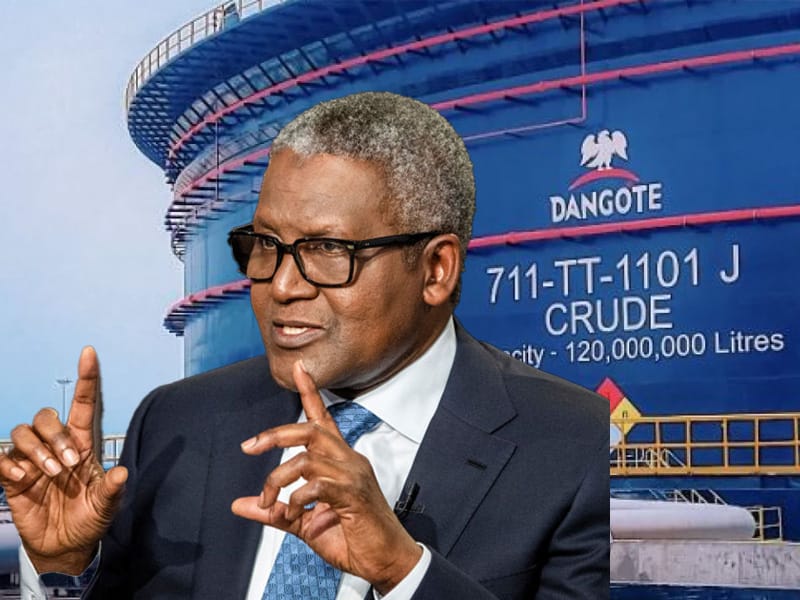By Victor Anazonwu
Aliko Dangote, Africa’s richest man and one of Nigeria’s most visionary entrepreneurs, is once again in a battle for the soul of his $20 billion mega refinery — a project he literally staked his life and fortune to build. His latest adversaries are two of Nigeria’s most powerful trade unions: the Petroleum and Natural Gas Senior Staff Association of Nigeria (PENGASSAN) and the Nigeria Union of Petroleum and Natural Gas Workers (NUPENG).
Dangote’s new “offence”? Importing about 3,000 trucks to help lift refined products from his 650,000-barrel-per-day refinery in Lagos. The unions cried foul, claiming that he was encroaching on their long-standing turf — the lucrative business of petroleum product transportation. For decades, their members have controlled how fuel moves across Nigeria once it leaves the refineries or ports. That monopoly gave them immense leverage. Now, Dangote’s trucks have poured sand into their garri.
To justify their pushback, the unions suddenly remembered that Dangote’s workers were not unionized — something they conveniently ignored for over two years until the new CNG trucks rolled in from China. They threatened to picket the refinery and shut down operations. It was the latest in a long list of hostilities faced by Dangote from entrenched interests terrified that one man — a Nigerian, not a foreigner — might finally succeed where the state and its cronies had failed.
The Refinery Wars
Dangote’s troubles did not begin today. Shortly after the fanfare of commissioning, the refinery faced an existential crisis: the Nigerian National Petroleum Company (NNPC) refused to supply crude oil. Without crude, the multi-billion-dollar refinery was nothing more than an expensive sculpture. NNPC claimed that Nigeria’s production quota had already been tied to advance sales and other obligations.
But Dangote wasn’t fooled. He publicly accused powerful cabals within NNPC of waging a proxy war on behalf of vested interests who had grown fat from “importing” substandard refined fuel from blending plants in places like Malta. It took a presidential intervention for crude supplies to finally begin flowing to his facility — proof that the earlier excuses were a smokescreen.
No sooner had that battle ended than another began. NNPC suddenly announced the “revival” of one of its moribund refineries and released video footage of trucks loading fuel as “evidence” of its miraculous resurrection. A price war ensued, accompanied by allegations that Dangote’s products were substandard. Once again, he had to defend the integrity of his operations and expose the vested interests seeking to sabotage him.
When Success Becomes a Crime
In most countries, attacking a project of such national significance would be unthinkable. The Dangote Refinery is not just a private venture; it is arguably the most strategic industrial asset ever built in Nigeria — one that could finally end decades of wasteful fuel imports, create thousands of jobs, and turn Nigeria into a net exporter of refined products.
Yet, in Nigeria, success attracts hostility. Many cannot stomach the idea that Dangote — a homegrown entrepreneur — might succeed where foreign interests have profited from our failures. For them, it’s better to pull him down than to let him “show off.” This, tragically, is the same envy that has dogged another high-achieving group in Nigeria: the Igbos.
The Igbo Parallel
Long before Aliko Dangote, the Igbos of southeastern Nigeria faced similar resentment for their resilience, enterprise, and success. Their “crime” — like Dangote’s — is daring to excel. They thrive where others tremble. Their fortitude has brought them fortune, and for that, they are resented.
Decade after decade, the Igbos have been systematically sidelined from Nigeria’s highest political offices. Some of their compatriots cannot live with the thought of the commercially successful Igbo also “succeeding” in politics. So, they’d rather Nigeria perish than move forward under an Igbo president – even if he’s the best candidate. The logic is perverse: likebenching one of your best players simply because you fear he might score too many goals? A wiser team would leverage such talent to win championships — because when the team wins, every player shines.
The myth of “Igbo domination” — the fear that an Igbo president would marginalize others — is an elaborate fiction invented by jealous rivals, notably politicians. Across Nigeria and the world, the Igbos coexist peacefully with other ethnicities. They marry across tribes, build businesses everywhere, and contribute immensely to local economies. Like every other group, they also have the bad and ugly. But that doesn’t honestly define them. There’s a reason they say in Igboland: Oje mba enwe ilo
A Record of Peace and Productivity
Despite suffering some of the worst violence in Nigeria’s history, the Igbos have one of the lowest records of organized retaliation against other ethnic groups. Even during the pogroms of 1966–67, there were no widespread revenge killings in the East. The Igbo worldview abhors bloodshed, especially of anyone who has not directly harmed you. They believe that vengeance belongs only to God. They fight only in self-defenseor in defense of their human dignity.
It is ironic, then, that a people so peace-loving and industrious are treated as threats rather than assets. While other regions celebrate their areas of comparative advantage — the Yoruba in finance and creative industries, the Fulani in livestock trade, the Hausa in agriculture — many seem obsessed with curtailing Igbo progress in commerce and politics.
The Crab Syndrome
In psychology, “crab mentality” describes a mindset where individuals pull down anyone trying to climb out of the bucket. Nigeria has perfected this destructive behavior. We punish excellence and reward mediocrity. We attack those who build, innovate, and inspire — and then lament our underdevelopment.
Today, both Aliko Dangote and the Igbos are victims of the same national malaise: envy disguised as patriotism, sabotage masquerading as socio-political equity. Nigeria’s greatest tragedy is not the lack of talent, but the persecution of it.
A House Divided Against Itself
Nature has already distributed gifts among Nigeria’s diverse peoples. To one region, academic brilliance; to another, entrepreneurial flair; to yet others, creativity, stamina, and athletic abilities. No group is more gifted than the other – only differently gifted. Like the sons of Jacob, we each have our star. But as in the biblical story of Joseph, some have chosen to hate the dreamer instead of embracing the dream.
We all know how that story ended — four centuries of slavery and exile. Nigeria must choose a wiser path. If we continue to punish those who build and envy those who rise, the “Promised Land” will remain forever out of reach.
Victor Anazonwu is a writer and public affairs analyst. He is the author of five books, including What Everyone should know about Nigerian History Politics and Government (2017).


























